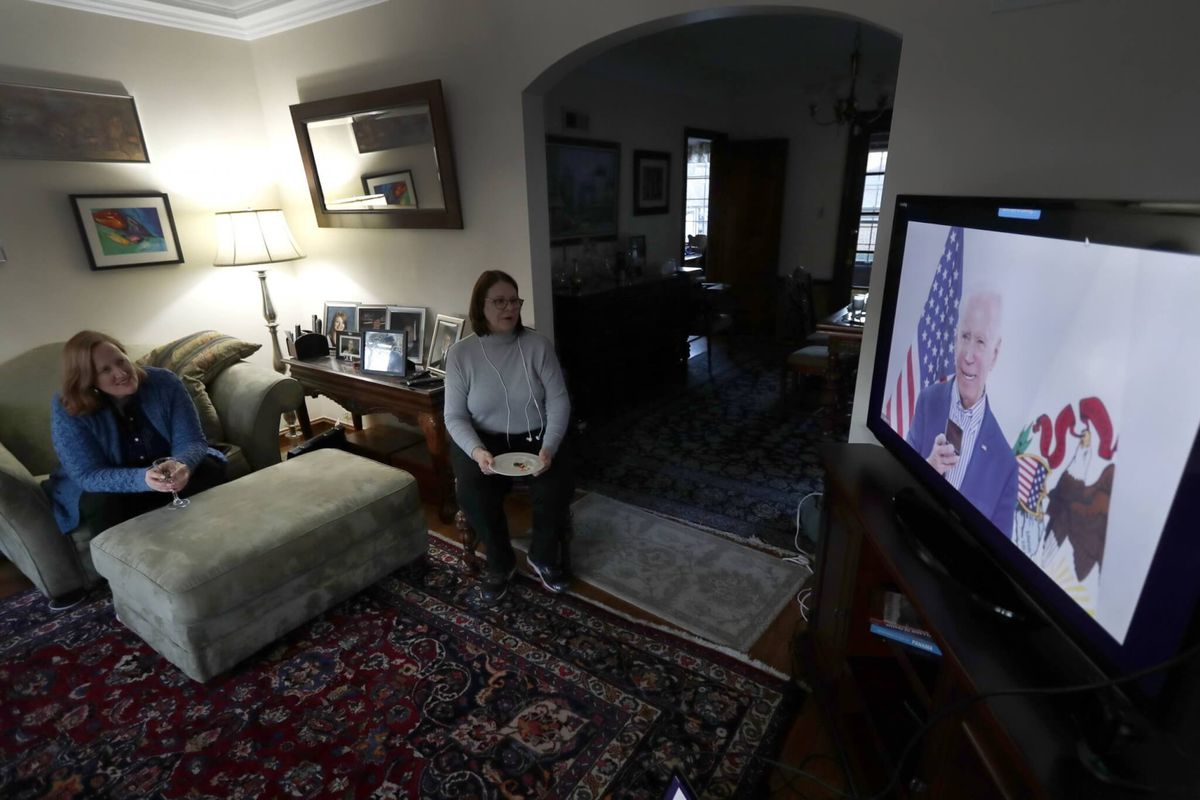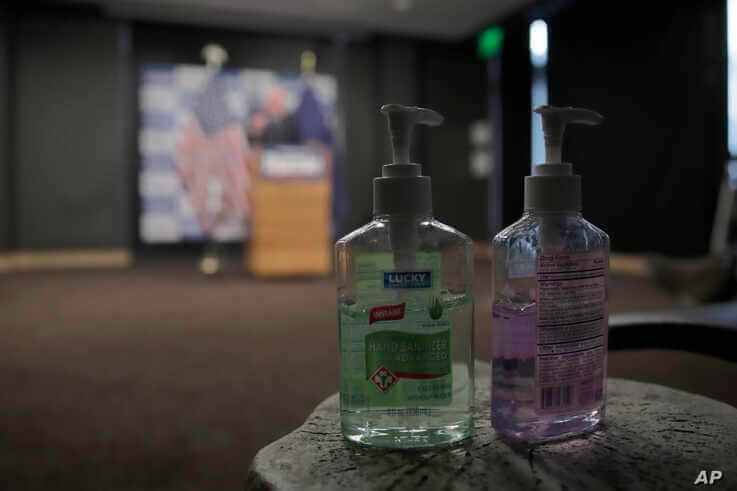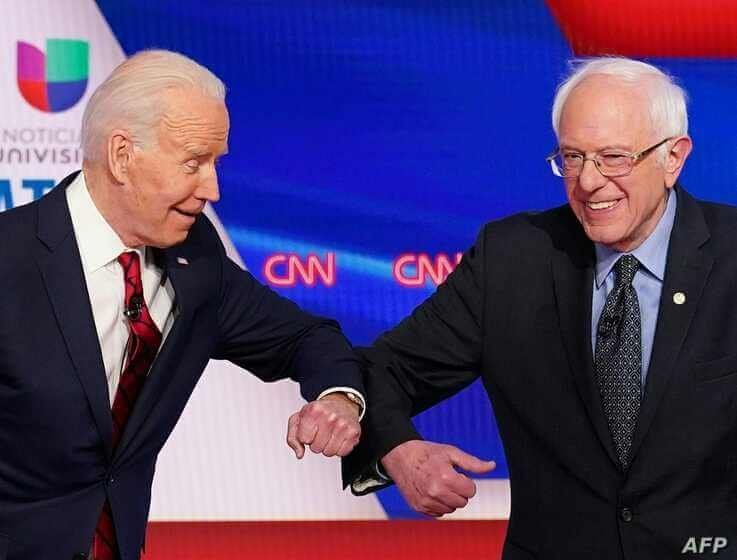
Biden, Sanders Staging Virtual Rallies Amid Coronavirus Fears
With fears of the coronavirus pandemic sweeping the U.S., Democratic presidential candidates Joe Biden and Bernie Sanders are staging virtual rallies Monday, a day ahead of presidential nominating primary elections in four states that Biden is expected to win handily.
Gone are huge public rallies with thousands of people, a time-honored staple of the U.S. political scene.
With federal officials advising against large gatherings for any type of event, Biden, the front-runner for the Democratic nomination to oppose Republican President Donald Trump in the November national election, is hosting a "tele-town hall" with voters in Arizona, Florida, Illinois and Ohio, the four states with primaries Tuesday.
Biden's campaign said he would listen "to voters' concerns and ideas around restoring the soul of the nation, rebuilding the middle class, and unifying the country."
Meanwhile, Sanders is holding a "virtual campaign rally" that includes two celebrity guests — actress Daryl Hannah and musician Neil Young.

Biden already holds a sizable lead in pledged delegates to the Democratic national convention in July and forecasters are predicting he could win about 200 more delegates than Sanders in the four contests Tuesday.
Thousands of voters have cast early ballots or voted by mail in the four states. But the extent of the Election Day turnout is uncertain because of the spread of the deadly coronavirus and the fears of many voters of getting caught in close proximity to other people in long lines while waiting to vote.
In Florida, one election official reported that about 650 of the 3,500 people who had agreed to work at the polls have now backed out because of their fear of becoming infected with the deadly virus.
Sunday's debate
Biden, vice president under former U.S. President Barack Obama, and Sanders, a senator from the northeastern state of Vermont, engaged in a lively, two-hour debate Sunday night. Both Biden and Sanders assailed Trump's three-plus-year presidency, while quarreling with each other over what policies are best to push to voters to try to deny Trump a second four-year term in the White House.
Biden announced that he would pick a woman as his vice-presidential running mate. No woman has ever been elected as the U.S. president or vice president, with Hillary Clinton losing to Trump in 2016 and two vice-presidential candidates falling short in 2008 and 1984. Sanders said that "in all likelihood" he also would pick a woman as his No.2, provided he finds someone who agrees with his progressive policies.
Both Biden and Sanders attacked Trump's handling of the coronavirus pandemic in the U.S., with Sanders accusing him of "undermining scientists" and Biden faulting the administration for refusing in the early stages of the crisis to import test kits from other countries when the U.S. had the opportunity to do so.
"This is like we are being attacked," Biden said. "In a war, you do whatever is required to do to take care of your people. Everything you would need to take care of this crisis would be free. It would be paid for by the U.S. taxpayers."
Biden said he would call in the military to cope with the crisis while Sanders skirted the issue. Instead, Sanders complained about Trump undermining the government's response by contradicting what government experts and scientists have recommended.
"What we have to do is shut this president up," he said.
But the two Democrats quarreled with each other on how best to take on Trump, the New York real estate mogul and first-time politician who won an upset victory in 2016 to become the country's 45th president.
Health care
Biden, who is making his third run for the presidency over three decades, and Sanders, a self-declared democratic socialist, often argued over the minutiae of legislation in the U.S. Congress when both were senators and later when Biden served two terms as vice president from 2009-2017.

Sanders called for a political revolution to take on special interests that control health care and energy production in the U.S. Biden promoted less dramatic changes, but ones that also would move American policies significantly to the left philosophically from the Trump administration.
Sanders argued that his plan for a government takeover of health care in the U.S. – he calls it Medicare for All – was a moral imperative so that "everyone will get the care they need." Biden said his plans for more measured improvements on top of the health care plan adopted under Obama – popularly known as Obamacare – would help more Americans at less cost.
"People are looking for results, not a revolution," Biden said. "What people want is hope and they need it now, not four years from now."
Biden at one point cut off Sanders, saying: "With all due respect to Medicare for All, you have a single-payer system in Italy. It doesn't work there." Biden was referring to the coronavirus crisis in Italy that is among the worst in Europe. "It has nothing to do with Medicare for All — that would not solve the problem at all. We can take care of that right now by making sure that no one has to pay for treatment period because of the crisis," he said.
Other issues
On another issue, Sanders attacked Biden's support for the 2008 bailout of floundering Wall Street financial giants as the recession worsened more than a decade ago. Biden retorted, "It kept us from going into a depression."
Sanders also criticized Biden's support of the 2003 U.S. invasion of Iraq, which Biden now admits was a mistake.
Sanders claimed Biden supported cuts in the country's cherished Social Security payments to older Americans.
"No, I did not," Biden responded sharply.
Sunday's debate had been scheduled before a live audience, just as with a string of previous Democratic encounters. But the spread of the deadly coronavirus forced the two longtime politicians into CNN's Washington studio and there was no audience, in an effort to limit the possibility of exposing even more people to the virus.
After a stumbling start in the first three presidential nominating contests in February, Biden has won 16 of the last 21 state elections and is heavily favored in the Tuesday voting.
Biden needs a majority of at least 1,991 delegates at the convention and currently leads Sanders, 809-666. Projections at the fivethirtyeight.com political forecasting site say Biden is likely to add another 200 delegates to that margin in Tuesday's voting.
 Will the CoronaVirus Change Americans Minds About Socialism?Next PostOhio Postpones Democratic Primaries as 3 States Go Ahead With Voting
Will the CoronaVirus Change Americans Minds About Socialism?Next PostOhio Postpones Democratic Primaries as 3 States Go Ahead With Voting







